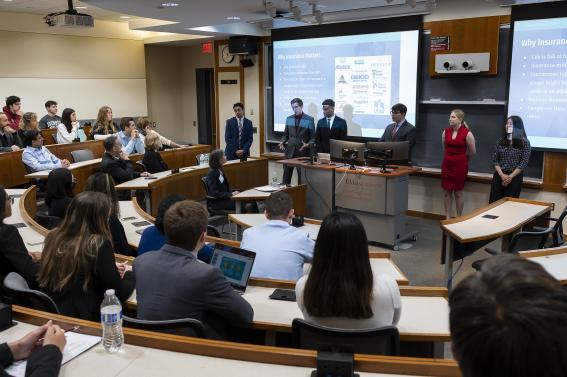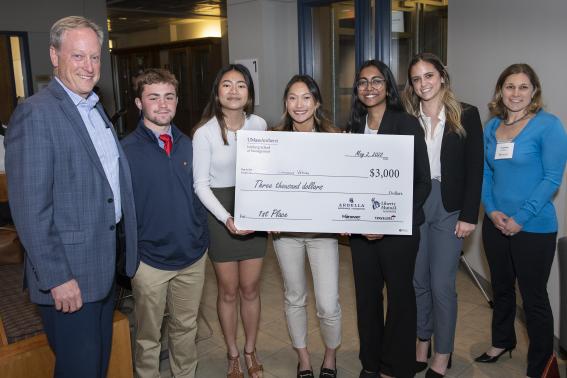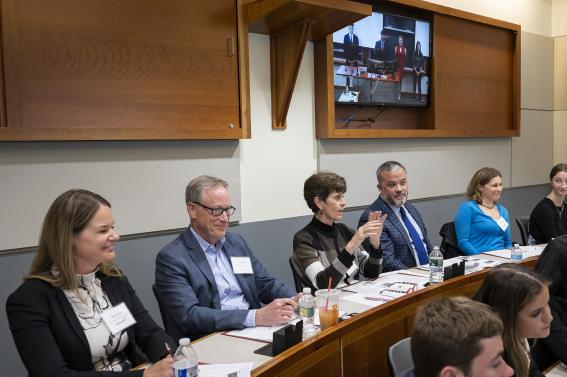First-Year Students Explore Insurance Challenges for New Competition
May 11, 2022

How can smart devices help prevent or mitigate damage to homes and businesses during disasters such as fires and storms?
How should the insurance industry react to disruptive “insurtech” companies—including those that offer on-demand policies through an app and others that can use AI to increase customer efficiency?
What types of policies, benefits, and workspaces can help the industry attract a diverse cross-section of Gen Z employees?
How should the insurance industry respond to the ethical questions about fault and liability posed by autonomous vehicles?
First-year Isenberg students taking the required Transitions seminar dug into some of the most urgent questions facing the insurance industry in 2022, which were posed by company representatives as part of a new Insurance Project Challenge this spring. The students formed teams and created presentations, competing against groups from all 49 sections of the required course to share well-researched ideas about some of the most pressing issues facing the industry. Four finalist teams presented at a live event on May 2, submitting their work to a panel of judges representing four companies: Arbella Insurance, Liberty Mutual Insurance, the Hanover Insurance Group, and Travelers.

The Arbella Insurance Foundation and Liberty Mutual both signed on as premium sponsors of the challenge, with Hanover and Travelers supporting the event as sponsors.
“The industry wants to attract talent,” said Jim Hyatt, executive vice president and chief underwriting officer of the Arbella Insurance Group, who graduated from Isenberg with a degree in finance in 1985. The Insurance Project Challenge was Hyatt’s brainchild—he brought the idea to Holly Lawrence, Isenberg’s assistant dean of the Office of Career Success and one of the faculty members who oversees the school’s first-year Transitions seminar. “Getting a bunch of folks to engage with this content will help create that initial step to get people interested in an industry that at first glance might not seem that dynamic,” Hyatt says. “We know we’ve got to hit them first year, second year, third year, and build that knowledge base and awareness of the industry.”
Students were intrigued by the complexity of the challenges: “I could definitely see myself working in the insurance industry after undergrad,” said Shriyaa Chittibabu, a first-year finance and economics double major whose team’s presentation on autonomous vehicles won first place. “This challenge truly reflected how crucial insurance is to the modern world. While our project related to autonomous vehicles, other projects related insurance to other critical matters such as technological advancements, climate change, generational collaboration, and mental health.”

Emily Hughes, vice president and manager of underwriting strategy and performance with Global Risk Solutions at Liberty Mutual (who graduated from UMass Amherst with an engineering degree in 2001), helped judge the final presentations. “What we’re looking to get out of this is increased exposure to the insurance industry, so we can share what an exciting and dynamic career opportunity it is,” she said. “We’ve been very impressed with the performance and the insight and preparation from the students.” Hughes and Hyatt were joined on the judges’ panel by representatives from the other sponsoring partners—Mike Lewis ’98 (finance), vice president of corporate strategy at Hanover, and Allison Torres ’08 (finance and economics), assistant vice president for business technology operations at Travelers—as well as the dean of the Isenberg School of Management, Anne Massey.
All four finalist teams received monetary prizes from the sponsoring companies:
- 1st place ($3,000): Emma Aborn, Rory Murphy, Shriyaa Chittibabu, Harriet Gerochi, Trey Glodis
- 2nd place ($1,500): Maggie Gardner, Eli Grehn, Megan Kaul
- 3rd place ($1,000): Asia Waitekus, Fiona Tanikonda, Abel Tadesse, Daniel Siegel, Gwun Wong
- 4th place ($500): Nareg Aboyan, Daniel Bowen, Jack Fallon, Lovens Lamousnery, Ella Slavin-Reker, Olivia Vadnais
The partnership between Isenberg and the project’s sponsors serves both parties, said Lawrence: “By developing projects from the insurance industry, we were able to expose students to business challenges that span different functional areas, such as HR and analytics.”
And Isenberg’s Dean Massey sees value in the collaboration. “The insurance industry is a major player in the Northeast,” she said. “It is also a very interesting industry, with a focus on new technologies that are changing business models and customer experiences. These companies need talented students like the ones who study at Isenberg. Our partnership with the insurance industry is part of our ongoing efforts to make sure our students are exposed to a variety of industries and the interesting career opportunities offered by them.”
Harriet Shane Gerochi, a first-year OIM and HTM major who was also on the winning team, said she enjoyed networking with the insurance industry representatives and learning more about their work. She added that her team members would split the $3,000 in prize money evenly. “Personally and quite fittingly, I'll be putting my money toward the car insurance that I just got.”